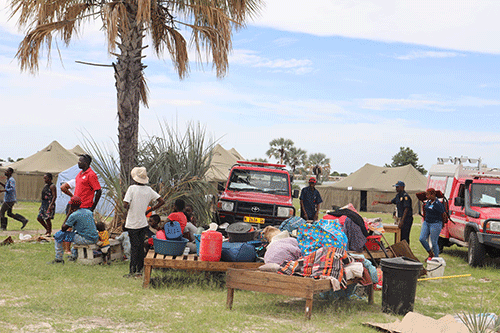After months of flooding in the northern parts of the country, the waters have finally receded in many places. However, hundreds of families remain displaced and uncertain of their future.
The authorities in the Ohangwena region, one of the highly-affected regions, said they do not plan on relocating those displaced back to their homesteads as yet.
“It is still rainy season, and it might flood again. Once the rain is completely gone, we will then look into the relocations”, Ohangwena Regional Council spokesperson Silas Nepembe told New Era.
He said the government continues to provide necessities such as food, healthcare services and psychological support for the victims.
Nepembe, however, acknowledged that the road to recovery will be a long and arduous one for many whose homes and crop fields were washed away.
“Many people’s mahangu fields and houses were submerged; their properties were destroyed. So, before we think of even relocating them, we first have to assess their situations individually, and see how best we can assist them to rebuild their lives. It will take quite some time,” he noted.
Over 400 residents of the Ohangwena region have been relocated to the Oshikango and Ohangwena constituencies’ flood centres.
However, some already moved back to their houses. Currently, there are 390 residents who are still at the centres.
Contrary to the situation in the Ohangwena region, those who are currently displaced in the Oshana region are those who settled in flood-prone areas in Oshakati town.
About 230 people are still displaced.
Speaking to New Era, Oshakati Town Council spokesperson Katarina Kamari said the flood has subsided, and it is thus safe for the victims to be relocated to their houses.
Nonetheless, she acknowledged the victims’ concerns that their homes might be flooded again.
“Based on the predictions we have so far, we don’t foresee more rain coming. We will see how the situation goes in the coming weeks. In the meantime, the emergency team in the region is visiting households which were washed away to assess the situation and see if it is safe for the victims to move back to their houses,” continued Kamari.
Asked if the council has any plans in place to compensate those affected once they are relocated, she replied that the council doesn’t have a budget at the moment to accommodate the victims. However, the only mechanism is to move them from flood-prone areas to higher land, as part of their five-year strategic plan.
“The majority of the victims settled at water streams. Hence, their houses were flooded, but we will continue with our annual plan to relocate them to higher grounds,” she added.
All the schools which were closed in both regions have also resumed classes.
Last month, the government made N$72 million available to fund a flood relief programme through the Office of the Prime Minister.
This funding is for the provision of relief in the form of water, tents, food, mosquito nets, hygiene items, life jackets, blankets, mattresses and psychological support to flood-affected communities.
The government has likewise approved the provision of food assistance to the affected communities for 16 months, or until the next harvest.
-ashikololo@nepc.com.na


